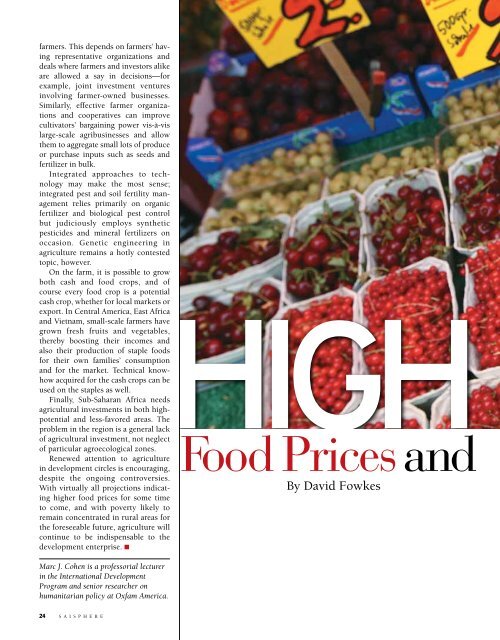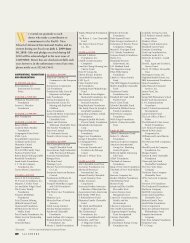Download Current Issue - SAIS
Download Current Issue - SAIS
Download Current Issue - SAIS
Create successful ePaper yourself
Turn your PDF publications into a flip-book with our unique Google optimized e-Paper software.
farmers. This depends on farmers’ having<br />
representative organizations and<br />
deals where farmers and investors alike<br />
are allowed a say in decisions—for<br />
example, joint investment ventures<br />
involving farmer-owned businesses.<br />
Similarly, effective farmer organizations<br />
and cooperatives can improve<br />
cultivators’ bargaining power vis-à-vis<br />
large-scale agribusinesses and allow<br />
them to aggregate small lots of produce<br />
or purchase inputs such as seeds and<br />
fertilizer in bulk.<br />
Integrated approaches to technology<br />
may make the most sense;<br />
integrated pest and soil fertility management<br />
relies primarily on organic<br />
fertilizer and biological pest control<br />
but judiciously employs synthetic<br />
pesticides and mineral fertilizers on<br />
occasion. Genetic engineering in<br />
agriculture remains a hotly contested<br />
topic, however.<br />
On the farm, it is possible to grow<br />
both cash and food crops, and of<br />
course every food crop is a potential<br />
cash crop, whether for local markets or<br />
export. In Central America, East Africa<br />
and Vietnam, small-scale farmers have<br />
grown fresh fruits and vegetables,<br />
thereby boosting their incomes and<br />
also their production of staple foods<br />
for their own families’ consumption<br />
and for the market. Technical knowhow<br />
acquired for the cash crops can be<br />
used on the staples as well.<br />
Finally, Sub-Saharan Africa needs<br />
agricultural investments in both highpotential<br />
and less-favored areas. The<br />
problem in the region is a general lack<br />
of agricultural investment, not neglect<br />
of particular agroecological zones.<br />
Renewed attention to agriculture<br />
in development circles is encouraging,<br />
despite the ongoing controversies.<br />
With virtually all projections indicating<br />
higher food prices for some time<br />
to come, and with poverty likely to<br />
remain concentrated in rural areas for<br />
the foreseeable future, agriculture will<br />
continue to be indispensable to the<br />
development enterprise. n<br />
Marc J. Cohen is a professorial lecturer<br />
in the International Development<br />
Program and senior researcher on<br />
humanitarian policy at Oxfam America.<br />
24 <strong>SAIS</strong>PHERE<br />
HigH<br />
Food Prices and<br />
By David Fowkes



